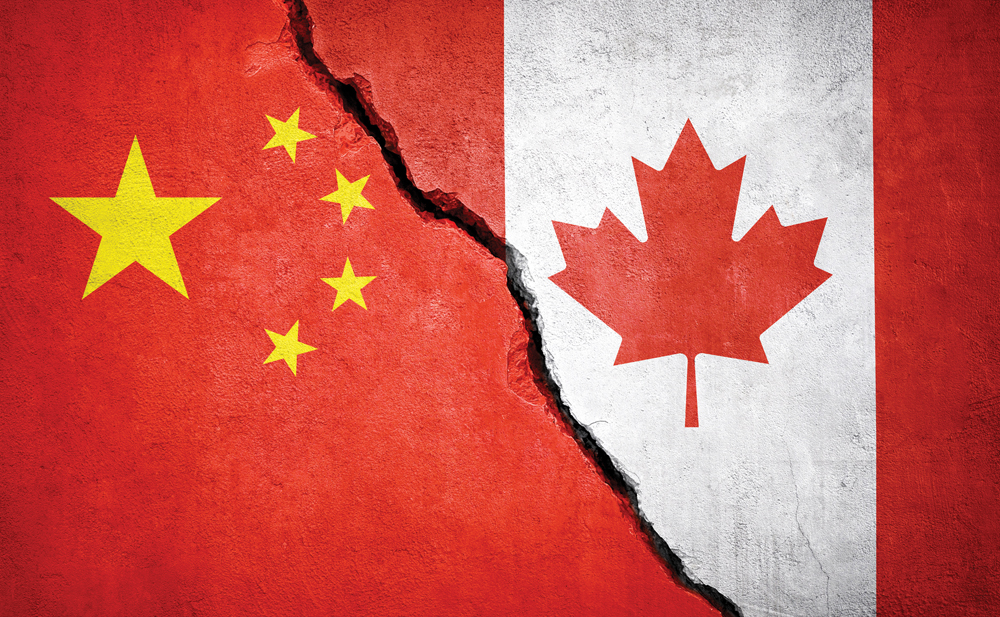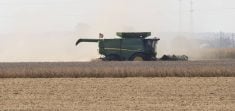Agricultural exporters are optimistic that a trade war won’t result from the latest Chinese-Canadian diplomatic spat.
The current dispute is the result of leaked reports from the Canadian Security Intelligence Service, cited by the Globe and Mail. The reports indicated that Conservative Member of Parliament Michael Chong had been targeted by China for criticizing its treatment of the country’s minority Muslim Uyghur population. The Globe article alleged that China was gathering information on Chong’s family members in Hong Kong for the purpose of intimidation.
The story followed reports of other alleged political interference from China, including Globe reports earlier this year, also based on CSIS documents, that pointed to Chinese plans to influence the 2019 and 2021 elections.
Read Also

AAFC organic research program cut
Canada’s organic sector says the loss of a federal organic research program at Swift Current, Sask., will set the industry back.
Fallout from the latest reports resulted in Canada declaring Zhao Wei, a diplomat from China’s Toronto consulate who is the centre of the allegations, “persona non grata” and ordering her to leave the country. The next day, China declared Jennifer Lynn Lalonde, a diplomat from Canada’s Shanghai consulate, “persona non grata” and ordered her to leave by May 13.
Why it matters: Agricultural exports have been affected by Canada-China trade relations in the not-so-distant past. There are fears that this latest dispute could similarly spill over.
Given the recent history of Chinese-Canadian trade relations, Canadian agricultural groups are concerned.
In 2018, Canada detained Meng Wanzhou, the chief financial officer of Chinese tech giant Huawei, at the request of the United States.
China later detained two Canadian citizens, Michael Kovrig and Michael Spavor, in a move that was widely seen as a response to Meng’s arrest. China also imposed trade restrictions on several Canadian agricultural exports, including canola and pork.
In March 2019, China suspended two Canadian companies, Richardson International and Viterra, citing quarantine pests found in canola shipments. In June of that year, Beijing halted beef and pork imports, citing falsified paperwork.
China did not officially connect Meng’s arrest with subsequent trade restrictions, although many trade experts said there was a connection.
The canola restrictions lasted until May 2022, well beyond the release of Meng Wanzhou in September 2021.
Fear of repeating history
Given public perception of what happened the last time Canada and China were at loggerheads, the Canola Council of Canada is monitoring current events.
“China is a very important market for Canadian canola,” said council president Jim Everson. “China is the largest oilseed importer in the world. So when our market access is blocked, it has implications for Canadian trade.”

Everson said those implications went beyond the two companies directly affected by the three-year ban.
“It also impacted the rest of the value chain,” he said.
An analysis of the impacts of the canola ban was commissioned by the canola council and released in February 2021. It indicated that lost sales and lower prices amounted to a loss of $1.54 to $2.35 billion for the industry.
While he wouldn’t speculate on current tensions, Everson said he hopes the two countries can resolve the dispute in ways that won’t affect economic trade.
“I see our role as ensuring that the Government of Canada is up to date on the state of trade with canola and the implications of any kind of disruption,” he said.
The 2019 pork ban, which lasted five months, also caused significant loss to Canada’s hog sector.
“It had a major impact because the door was closed, and for us, China is a significant market,” then Canadian Pork Council chair Rick Bergmann told the Co-operator in 2019. “They are our third largest market that we pursue.”
Bergmann estimated country-wide cost to the sector at roughly $10 million a week, which would bring the total cost to roughly $380 million.
The pork council declined to comment on the current diplomatic dispute.
While previous restrictions on pork and canola were resolved, the Canadian beef industry was later shut out of Chinese markets in December 2021 as a result of an atypical BSE case found in Canada. That case also prompted bans from South Korea and the Philippines.
Atypical BSE is a form that can occur naturally in older cattle, as opposed to classical BSE that is caused by an animal eating contaminated feed.
“[Atypical BSE] pretty much occurs in every cattle population around the world,” said Dennis Laycraft, Canadian Cattle Association executive vice-president. “Normally, as soon as you confirm it’s atypical, that pretty well ends the investigation. Those few countries that do suspend imports usually relist those countries fairly quickly.”
The Philippines and South Korea have both relisted Canadian beef, but Chinese bans are still in place.
Asked if he was concerned that the latest diplomatic dispute might prolong China’s resistance to reinstating Canadian beef, Laycraft said he hopes the restrictions are lifted soon and that the diplomatic tit-for-tat doesn’t flow into trade.
“We would really like to see China reopened; we are developing some really good customers in that market,” he said, adding that strong demand from Japan, the U.S. and Mexico has left the beef sector in relatively good shape.
“We actually had record exports in 2022, even though the Chinese market was closed,” he said. “We’re not in that vulnerable position, so we’re just taking this in stride. At some point, that market will reopen as they need more beef.”
In an emailed statement, Cereals Canada communications director Ellen Pruden said the organization sees no indication of disruptions to cereals trade due to recent events.
“Our industry has a long-standing relationship as a cereal grains supplier to the country. Canada’s cereal sector values stable and open trade and we know that good relationships are the foundation of successful business.”
Pruden also said Cereals Canada regularly communicates with the federal government about the value of that trade relationship.
Experts weigh in
Gordon Houlden, director emeritus of the University of Alberta’s China Institute, said early indications suggest the dispute won’t affect trade.
“My reading of the immediate reaction to the Canadian expulsion of the individual from Toronto is that it was a tit-for-tat, one-for-one,” said Houlden. “There’s nothing that prevented China from escalating. They could have done that and they chose not to.”
Houlden said China’s measured response indicates it is not looking to burn trade bridges.
“It’s been my impression ever since Meng Wanzhou was released that China is seeking to modulate and reduce the conflict between us.”
However, Houlden said this is only the first skirmish in what could develop into a broader struggle.
Former governor general David Johnston was named special rapporteur on foreign electoral interference in March and is expected to decide whether to pursue an inquiry on Chinese interference by late May. That may prompt further response.
“I think that China is also keeping [its] powder dry. These issues are going to change the overall relationship,” Houlden said.
But even if things do devolve further, he thinks China will try to avoid a trade war.
“I don’t believe that trade is their preferred medium of retaliation,” he said. “If we do something trade-related, then the story changes. But I think they would rather keep the political and diplomatic in one box and the trade in another.”
















